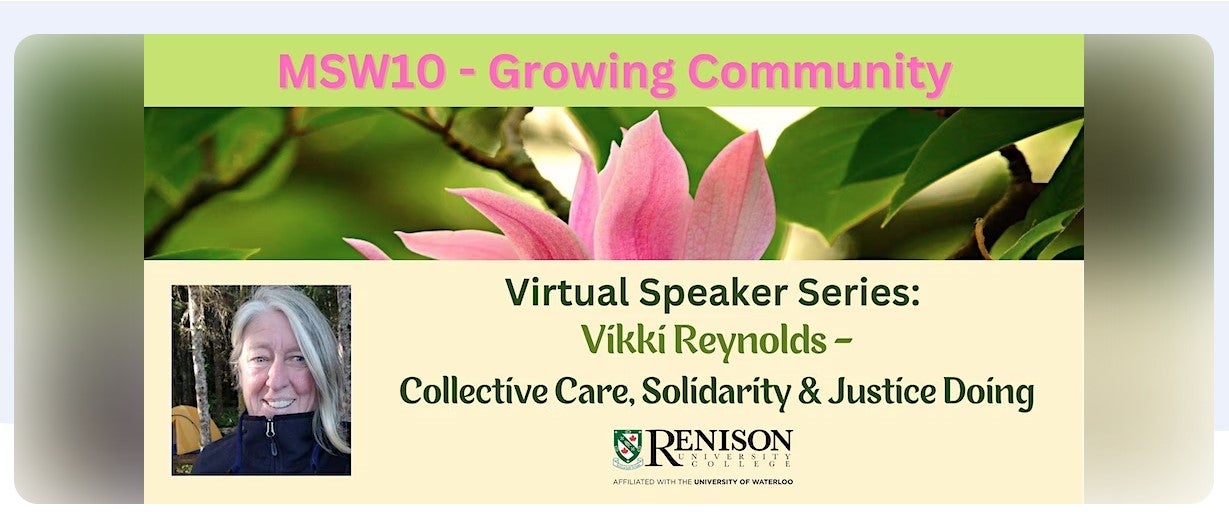
Our second Virtual Speaker Series was held on Wednesday March 8, 2023, 12.30 - 2.00 PM (ET), lead by Vikki Reynolds, talking about Collective Care, Solidarity and Justice Doing.
This event was not recorded, on request of the presenter.
Synopsis:
Vikki spoke about Collective Care, Solidarity and Justice Doing in the context of her social activism and feminist practice currently in Downtown Eastside in Vancouver where the opioid catastrophe is ongoing.
Some critical points and challenges that Vikki raised for those who engage in social and community work:
Justice-Doing
Doing justice means to put respect and dignity at the forefront of our work. We do justice not by making people accept and cope with their suffering but by gathering our collective power to transform oppressive systems that cause harm to individuals and communities. We can interrogate our language: “Trauma”: do we use this word to talk about someone’s brokenness, but not the context (such as the context of a rape culture)?
Justice doers must acknowledge that they are implicated in the catastrophes of white supremacy, colonization and genocide and must overcome the traps and exclusivity of professionalism, capitalism, psychology/trauma industry and policing mechanism employed for those regarded as resisting ‘service’. Professionals center dominant perspectives and practices and devalue minority languages, cultures and knowledges.
Justice doing is resisting necro-politics (A. Mbembe), policies that kill people and insists that gaps in services actually demonstrate “structural and targeted abandonment” (Ruth Wilson Gilmore). People with lived and living experiences are dismissed and invisibilized. Justice doing is about responding to oppression not to depression.
Solidarity
We are encouraged to ask ourselves:
- Why are we in this struggle?
- What really qualifies you?
- How are you still here?
- What is the best use of you?
We are constantly gaslighted about the existential crisis of refusing to accept this as normal and also being prepared for this every day. We need solidarity to face this contradiction together. Our education tells us that people are broken and needed fixing in the inside. We must be ready for these atrocious occurrences every day yet refuse to accept them to be normal. In the context of political violence, we must work in solidarity.
Collective Care
An ethical engagement can help us sustain our “ongoing aliveness, genuine connectedness with people and spirited presence”. We are not burned out, but we are in spiritual pain. If we don’t practice ethically, we feel spiritual pain. We are not depressed, we are oppressed, We are not anxious, we are living in dread. While self-care is essential while we fight for justice, it is not enough. We use self-care in order to get ourselves out of the way of responding to another’s suffering. We must practice collective care that allows us to take care of everything without involving the state, build mutual aid and solidarity teams that bring people together in the “warmth of the fire”. Collective is not unity but finding the points of connection so that we can build solidarity. We each need to build solidarity teams, by identifying: who/what it is that holds me up; who/what helps me feel and be safe; who/what witnesses me; who/what respects and dignifies me.
In the process, we practice revolutionary love – a commitment to others and solidarity with their cause. We stay human that allows us to take on oppression collectively and imagining a different world and bring in our “believed-in-hope” disposition. We can work together to stay human in situations that are beyond human understanding. We can engage in collective remembering in order to resist disappearance.